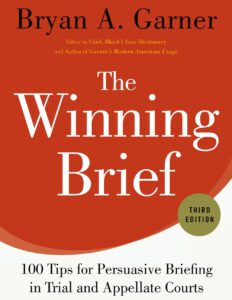The Winning Brief

This seminar specifically for litigators comprises 100 tips, each illustrated with good and bad examples from motions and briefs filed in courts throughout the country. Both the class and its 775-page coursebook (now in its third edition and published by Oxford University Press) are full of pointers that even the most accomplished brief-writers will find useful. Participants learn how to:
- Plan briefing projects for maximal efficiency—whatever the time constraints.
- Capture a judge’s imagination with the first few words.
- Avoid the mind-numbing conventions that make so many briefs boring.
- Meet page limits with greater ease.
- Counteract the exaggerated style of Rambo opponents.
- Persuade judicial readers more reliably.
Unlike Advanced Legal Writing & Editing, this course doesn’t require participants to do exercises. Instead, it covers much more material, and the coursebook supplies all the answers to editorial problems. It’s an excellent follow-up to ALW&E.
Read for yourself what people are saying about Professor Garner’s The Winning Brief seminar in their evaluations:
What was really helpful? Why?
- “This seminar—provided a useful ‘how to’ approach to make legal writing clearer and more useful.”
- “Great class even the second time around.”
- “The text is very well organized and will serve as a great resource.”
- “I am not a writer or an appellate attorney, but the principles espoused in this book will help me at trial.”
- “Deep issue. Citations in footnotes. No generic labels.”
- “The book is great; the clips from interviews are very insightful, as well. The explanations of tips are very helpful to a person who requires additional grammar training as myself!”
- “All of it—especially the issue framing, deep issues.
- “Every portion of the presentation was relevant to what we do.”
What would you tell your colleagues about this course?
- “It should be required for all attorneys. The most informative and enjoyable seminar I’ve attended in 25 years of practice—really.”
- “Take the course if they have the opportunity.”
- “This course was excellent. It reminded me why I went to law school in the first place—to be an effective advocate. Now I have more helpful tips to accomplish this.”
- “One of the best CLEs I’ve ever taken.”
- “That it will improve all aspects of legal writing—not simply briefs.”
- “I would recommend it highly.”
- “Attend!”
- “Worthwhile.”
- “You can start applying it right away.”
- “Any lawyer who does appellate cases should take the course. It would also be very useful for trial lawyers even if they never do an appeal—the record would be more complete!”
- “This is a must-take CLE. One of few CLEs that was interesting and engaging all day.”
- “I have made everyone who works for me take your course.”
- “I’m actually planning on drafting a memo especially about striking the needless legalese and also discussing specifics about framing issues, intros, and conclusions. Thanks a ton!”
- “Good course for all legal writers, not just for brief writers.”
- “This course restored my faith in legal writing.”
- “Take the course because it will help you become a better writer.”
- “The most useful CLE I have ever attended.”
LawProse Policy on In-House CLE Credit
Under state-bar rules, the hosting group is the proper applicant for CLE accreditation. We will supply you with the necessary attachments CLE applications require.